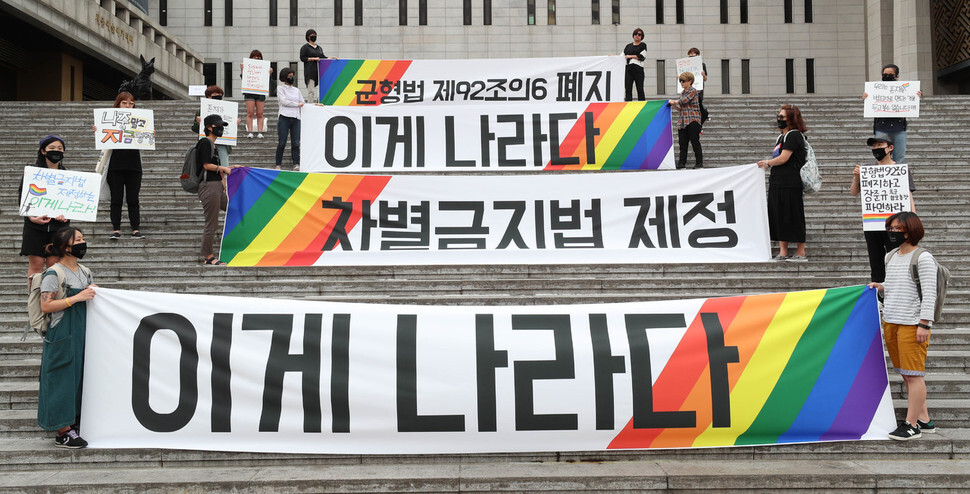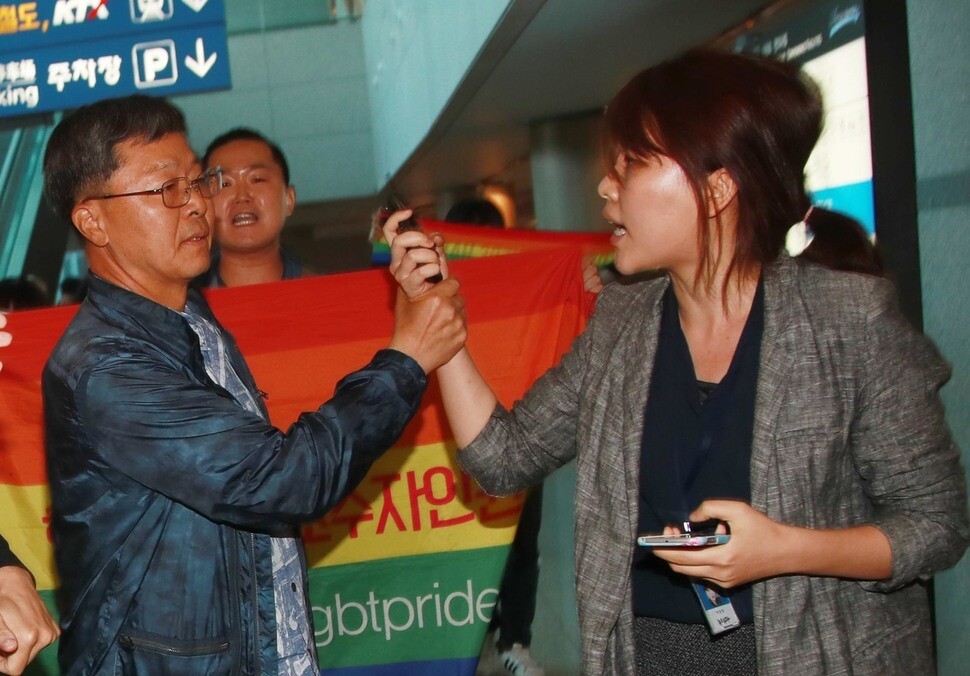hankyoreh
Links to other country sites 다른 나라 사이트 링크
Will new government repeal military’s banning of homosexuality?

After President Moon Jae-in instructed South Korean government departments on May 25 to increase their rate of acceptance for recommendations by the National Human Rights Commission, the next question is whether the government will accept recommendations already made by the commission to abolish Article 92-6 of the Military Criminal Act (which discriminates against homosexuals) and to enact the Anti-Discrimination Act. While Moon was running for president, he expressed reservations about these two recommendations on the grounds that there was not a social consensus about them.
Article 92-6 of the Military Criminal Act has come under scrutiny after a military court convicted a homosexual army captain of violating the article on May 24. The article states that “a person who commits anal intercourse with [a military person or semi-military person] or any other indecent act shall be punished by imprisonment with labor for not more than two years.”
The commission has adopted a clear stance on this article, which punishes consensual sex between homosexuals as an “indecent act.” Since the commission recommended that the government repeal or revise Article 92 of the Military Criminal Act and other laws that contain prejudice and discrimination against homosexuals as one of the key goals of the state’s basic plan for human rights policy in 2006, it has maintained its support for repealing the article. When the article was reviewed by the Constitutional Court in 2010, the commission submitted a brief argument that the article could be unconstitutional because it “infringes upon equal rights, the right to sexual self-determination and the right to secrecy and privacy for homosexuals in the military and it goes against the principle of ‘nulla poena sine lege,’” a legal phrase term meaning that no one can be punished for what is not legally prohibited. Senior Secretary to the President for Civil Affairs Cho Kuk himself signed the brief, since he was then a member of the commission at the time. Last year, the commission advised the South Korean government that the Ministry of Justice “needs to change its position” in line with a recommendation by the UN Human Rights Committee to scrap Article 92-6 of the Military Criminal Act, but the Ministry did not accept this.

Another longstanding recommendation of the commission is for South Korea to enact a comprehensive anti-discrimination act, which would ban discrimination against people for reasons of their gender, age, race, disability, religion, sexual orientation or academic background. In July 2006, the commission urged the Prime Minister to legislate an anti-discrimination law; this past April, it listed passing a comprehensive anti-discrimination law as one of 10 human rights tasks for the next government to pursue and expressed its regret that such a law had yet to be passed.
Moon expressed reservations on the issue in a response he sent to the Network for Reporting the Violation of the Human Rights of Sexual Minorities in Relation to the Military on Apr. 30, while he was still a presidential candidate. “Since the Constitutional Court has been asked to review the constitutionality of Article 92-6 of the Military Criminal Act, I think it is advisable to make a decision in line with the court’s ruling,” he wrote in his response. He was also apparently on the fence about anti-discrimination legislation, stating in a response to Amnesty International that “no one should be discriminated against, but there needs to be social consensus” about the legislation.
“If the Blue House is serious about its instructions to increase the rate of acceptance for commission recommendations, the new administration should take this opportunity to proactively accept recommendations by the commission that have not been implemented before,” said a coalition of human rights organizations working to empower the commission in a statement released on May 24. The coalition mentioned abolishing Article 92-6 of the Military Criminal Act and legislating the anti-discrimination act as some of the prime examples.
By Park Su-ji, staff reporter
Please direct questions or comments to [english@hani.co.kr]

Editorial・opinion
![[Column] Park Geun-hye déjà vu in Yoon Suk-yeol [Column] Park Geun-hye déjà vu in Yoon Suk-yeol](https://flexible.img.hani.co.kr/flexible/normal/500/300/imgdb/original/2024/0424/651713945113788.jpg) [Column] Park Geun-hye déjà vu in Yoon Suk-yeol
[Column] Park Geun-hye déjà vu in Yoon Suk-yeol![[Editorial] New weight of N. Korea’s nuclear threats makes dialogue all the more urgent [Editorial] New weight of N. Korea’s nuclear threats makes dialogue all the more urgent](https://flexible.img.hani.co.kr/flexible/normal/500/300/imgdb/original/2024/0424/7317139454662664.jpg) [Editorial] New weight of N. Korea’s nuclear threats makes dialogue all the more urgent
[Editorial] New weight of N. Korea’s nuclear threats makes dialogue all the more urgent- [Guest essay] The real reason Korea’s new right wants to dub Rhee a founding father
- [Column] ‘Choson’: Is it time we start referring to N. Korea in its own terms?
- [Editorial] Japan’s rewriting of history with Korea has gone too far
- [Column] The president’s questionable capacity for dialogue
- [Column] Are chaebol firms just pizza pies for families to divvy up as they please?
- [Column] Has Korea, too, crossed the Rubicon on China?
- [Correspondent’s column] In Japan’s alliance with US, echoes of its past alliances with UK
- [Editorial] Does Yoon think the Korean public is wrong?
Most viewed articles
- 1[Column] Park Geun-hye déjà vu in Yoon Suk-yeol
- 2Thursday to mark start of resignations by senior doctors amid standoff with government
- 3N. Korean hackers breached 10 defense contractors in South for months, police say
- 4Kim Jong-un expressed ‘satisfaction’ with nuclear counterstrike drill directed at South
- 5[Editorial] New weight of N. Korea’s nuclear threats makes dialogue all the more urgent
- 6Will NewJeans end up collateral damage in internal feud at K-pop juggernaut Hybe?
- 7[Column] ‘Choson’: Is it time we start referring to N. Korea in its own terms?
- 8[Editorial] Japan’s rewriting of history with Korea has gone too far
- 9[Cine feature] A new shift in the Korean film investment and distribution market
- 10[Column] The president’s questionable capacity for dialogue